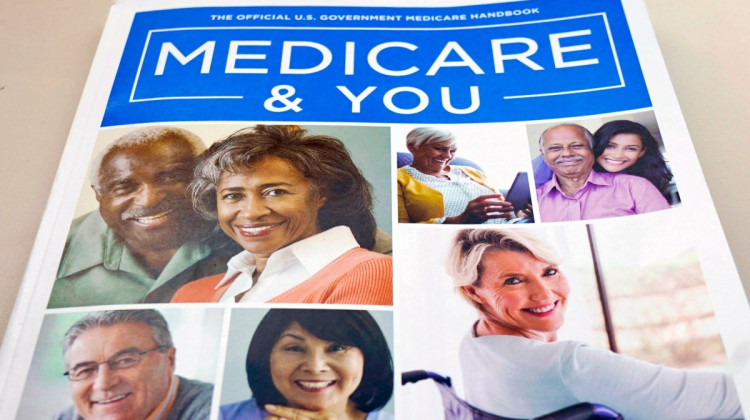
Hundreds of people marched around the IUPUI medical campus in Indianapolis on June 29 in support of abortion rights.
Darian Benson/WFYIMore than a thousand Indiana health care providers signed two letters to express concerns about the proposed abortion legislation lawmakers will vote on during the special session that starts Monday, July 25.
The proposed bill would ban abortion with limited exceptions for rape, incest and if the prengnacy poses a risk to the life of the pregnant person.
In one letter addressing Gov. Eric Holcomb and state legislators, 11 health groups – including the Indiana State Medical Association and the Indiana section of the American College of Obstetricians and Gynecologists – said the language in the proposed bill makes it hard for providers to judge when a medical procedure falls within the purview of the law.
“The problem is medicine doesn’t really work like that,” said Dr. Carrie Rouse, co-chair of the legislative committee for the Indiana section of the American College of Obstetricians and Gynecologists and a maternal fetal medicine physician with Riley Children’s Health. “We don't always know when something is going to tip over from being health threatening into life threatening, and our main job is to try and predict and prevent significant complications that could impair the health and certainly the life of that pregnant person.”
The letter also expresses concern that the way the bill is worded will create barriers to abortion services for victims of rape and incest.
Lack of clarity may jeopardize medical care
Studies show unexpected complications can arise during pregnancy, especially among people with pre-existing conditions. Rouse said she is concerned the legislation does not take this into account.
For example, the physical stresses of pregnancy may mean some patients with kidney disease could develop worsened kidney function. They could need dialysis for the rest of their lives or a kidney transplant. Patients on dialysis may have decades shaved off their life expectancy.
“There are many more conditions for which pregnancy increases the risk of long-term health complications, including life-limiting ones,” Dr. Christina Scifres, an OB-GYN with Riley Children’s Health, said in a press release. “Care of these patients should include counseling on the risks of ongoing pregnancy and the option for abortion.”
Rouse said the bill in its current form could put providers in an impossible ethical and legal dilemma.
“Physicians want to take care of their patients. They don't want to suffer legal consequences or threats to their license for practicing evidence-based medical care,” she said. “And when there is confusion and a lack of clarity in the laws, it can make it really hard for people to feel confident about what they are doing.”
One area of confusion involves treatment after a miscarriage, which requires one of the same medications used for abortion. Rouse said in some states with abortion bans, providers have had to jump through legal and logistical hoops before they are able to provide a patient with crucial medical care.
“There are reports from other states, certainly, that indicate that physicians and other health care providers may be hesitant to provide that care because they're worried about it being interpreted in a different way,” Rouse said.
Sen. Sue Glick (R-LaGrange), the bill's author, said the bill will not affect access to contraception or the morning after pill, also known as Plan B.
"This bill does not affect treatment of miscarriages, treatment of ectopic pregnancies," Glick said. "It does not affect in vitro fertilization procedures."
But legal experts say the bill is not clear on this topic.
The proposed legislation would allow victims of rape and incest to access abortion – but only after they provide an affidavit signed under penalties of perjury attesting to the rape or incest. It does not require a law enforcement report, which some other states with abortion bans do.
Still, Rouse worries this may deter victims from accessing abortion services.
“We know that many if not most rapes go unreported for a variety of reasons, including the patient is afraid of reprisal from the abuser. They don't want to enter into the criminal justice system,” she said. “And our job as physicians is not to be the physician arm of the law. We're here to provide evidence-based safe health care, and increasing the barriers to that health care is going to decrease the ability of patients to access it.”
‘Consensus on this issue is not possible’
Another letter, signed by more than 1,400 Hoosier health care practitioners, published this week with a similar message.
The Good Trouble Coalition, a grassroots organization of Indiana health care providers, points to the high maternal mortality rates in Indiana compared to nearly every other state in the country.
“No single explanation can account for why pregnant Hoosiers are more likely to die during or soon after pregnancy than elsewhere in the United States,” the letter states. “However, if access to abortion is further limited in our state, we know that many more deaths will result from pregnancy or pregnancy-associated conditions.”
Indiana ranks toward the bottom when it comes to maternal mortality rates, with Black women dying at the highest rates. Public health experts say if Indiana would impose a total abortion ban with no exceptions, the state could see as much as a 21 percent increase in pregnancy-related deaths overall and a 33 percent increase among Black women.
“We understand that there are widely held views regarding abortion, and that consensus on this issue is not possible,” the letter continues. “Given this fact, it seems unreasonable to pass laws that force one group’s moral views on everyone; especially when experts agree it will put people at risk and increase an already high maternal mortality rate in the Hoosier state.”
Brandon Smith, a reporter for Indiana Public Broadcasting, contributed reporting.
This story comes from a reporting collaboration that includes the Indianapolis Recorder and Side Effects Public Media, a public health news initiative based at WFYI. Contact Farah at fyousry@wfyi.org. Follow on Twitter: @Farah_Yousrym.
 DONATE
DONATE








 Support WFYI. We can't do it without you.
Support WFYI. We can't do it without you.